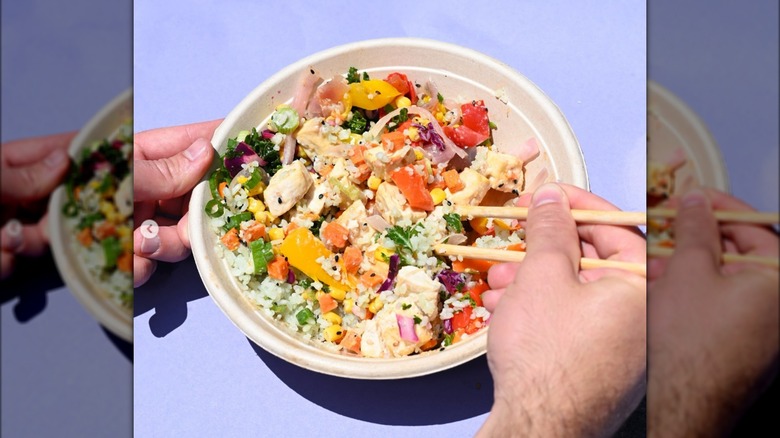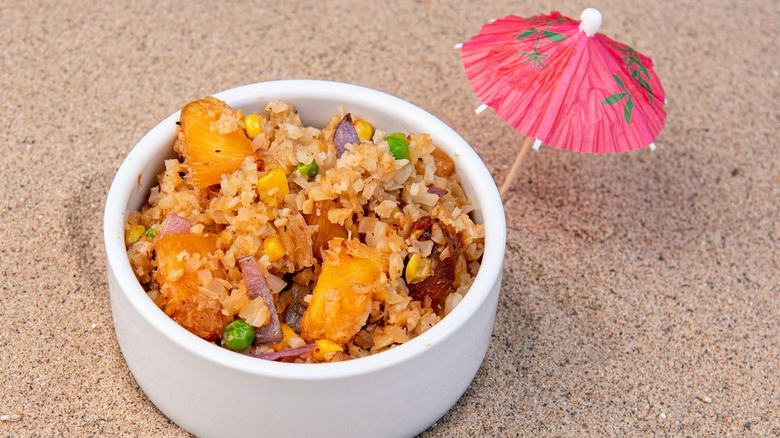What Happened To Salted After Shark Tank?
With dozens of businesses entering the tank each season, it's inevitable that some food companies don't land a deal on "Shark Tank." Sadly, one such company was Salted, a delivery-only restaurant group devoted to high-quality ingredients, clean eating, and consistent customer satisfaction.
Entrepreneur Jeff Appelbaum started Salted in 2014, hoping to escort the food industry into an age of ghost kitchens and technology-assisted service. That being said, unlike a lot of food businesses that take their idea for a new, niche snack to "Shark Tank," Salted is focused on curating existing restaurants.
As such, Salted took smaller brands under its wing, helping them expand in the digital space. After all, growth is a lot more cost-effective when you don't have to build a new location from the ground up. Of course, expansion still requires money, so Appelbaum brought Salted to the tank in 2020 with an ask of $500k in exchange for 5% equity. Where is Salted today?
The sharks had concerns about Salted Restaurant Group
Although initially intrigued by Jeff Appelbaum's concept of building a food empire without ever actually building physical restaurants (30:15), the sharks took a large step back upon hearing that Salted was on its third iteration. The company went from offering online cooking classes to meal kits, to its current delivery services (33:06).
Appelbaum attempted to get things back on track, explaining that Salted had made about $250k that month, on track to make $1.1 million in 2020 (33:47). Salted and its brands were available on all of the major food delivery apps, like DoorDash and Uber Eats, with five ghost kitchens across the U.S. (33:50)
However, the company had also lost a great deal of money, with some investors still waiting for their part of the initial $5 million to be paid back. In the end, each of the sharks went out, each having voiced concerns about the company, its stiff competition, and Appelbaum himself.
Salted continues to grow without the sharks' help
Salted Restaurant Group may not have gotten an investment from its "Shark Tank" appearance, but it did leave with something perhaps even more important — an audience. As of Jeff Appelbaum's pitch, Salted was not spending money on customer acquisition; instead, the company was relying solely on the marketing efforts of the food delivery apps it had partnered with.
Thanks to the publicity from the show, Salted was able to swoop into new ghost kitchen spaces across 10 states. Armed with the knowledge that ghost kitchens might be the future of fast food, Appelbaum and Salted were able to ride out the pandemic with reasonable success.
In 2021, Salted pulled another $9 million from investors, with promises to revolutionize the 'healthier' fast food space. In an interview with QSR Magazine, Appelbaum explained that he was determined to give his customers sustainable options without asking them to sacrifice convenience. That being said, how is Salted faring these days?
Salted is still making waves with its attention to quality
Given the increased demand for food delivery services and sustainable brands, it should come as little surprise that Salted Restaurant Group is still in business as of late 2023. Salted has an estimated net worth of $9 million, with over $20 million in lifetime sales. The company continues to operate only six brands — lulubowls, ginger bowls, moon bowls, Thrive Kitchen, $5 Salad Company, and Califlower Pizza.
Interestingly, Salted does not have its own social media pages and is barely given any mention on founder Jeff Appelbaum's Instagram. That being said, a couple of its brands — specifically moon bowls and Califlower Pizza — have several thousand fans each on their individual Instagram pages. In other words, even if Salted is backing away from the limelight, at least the brands it supports seem to be doing well. However, we all know how much the fast food space can fluctuate, so success right now doesn't mean that Salted will continue to succeed. What's next for the company?
The future of Salted Restaurant Group is shaky at best
Though there is a difference between ghost kitchens and virtual restaurants, both seem to be the future of fast food. Still, no one can say for sure where the industry will be 10 years down the road. Regardless, Salted plans to have 60 locations across the U.S. by 2024, likely with more added each year thereafter.
Even with several years of relative success, however, the fact remains that Salted isn't exactly alone in its goal to provide Americans with healthier, more sustainable food options at the same level of convenience as traditional fast food. Many large restaurant chains, for instance, also offer plant-based burgers, salads, and grain bowls, with the added benefit of already being well-known. Really, who can top Taco Bell's vegan-friendly menu in terms of brand recognition?
With all that being said, Salted has already come this far without being edged out by competitors, so fans obviously see something worthwhile in the company even if the "Shark Tank" investors didn't. Only time will tell.




